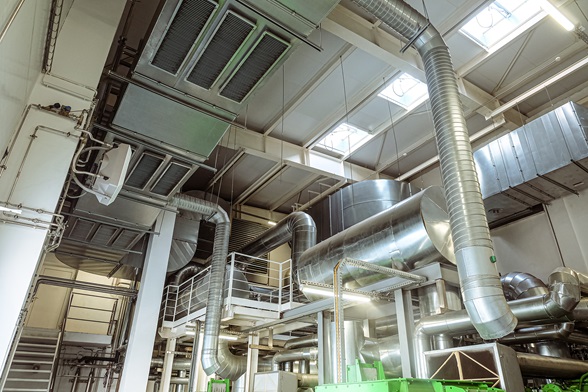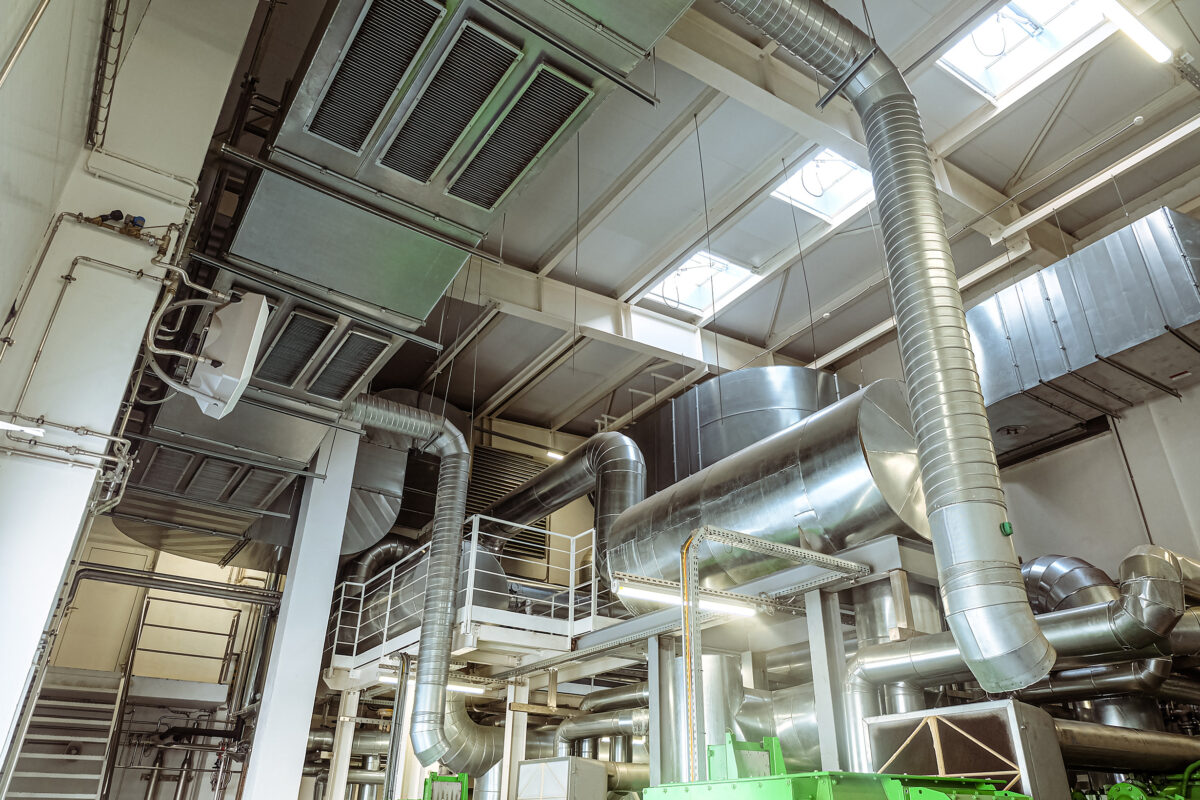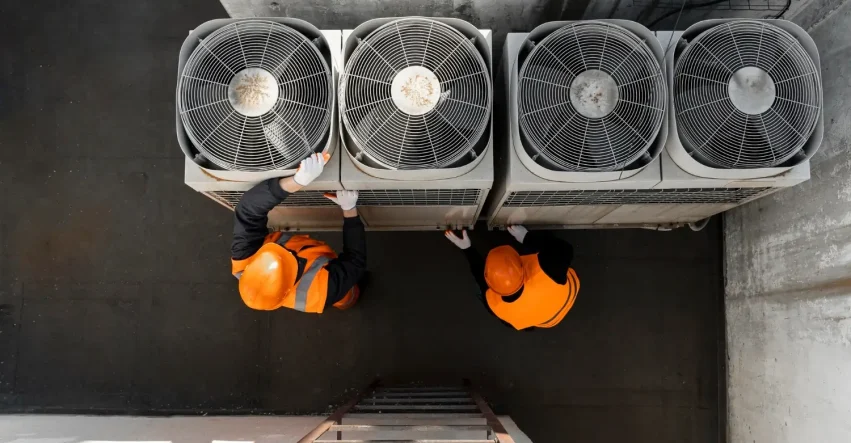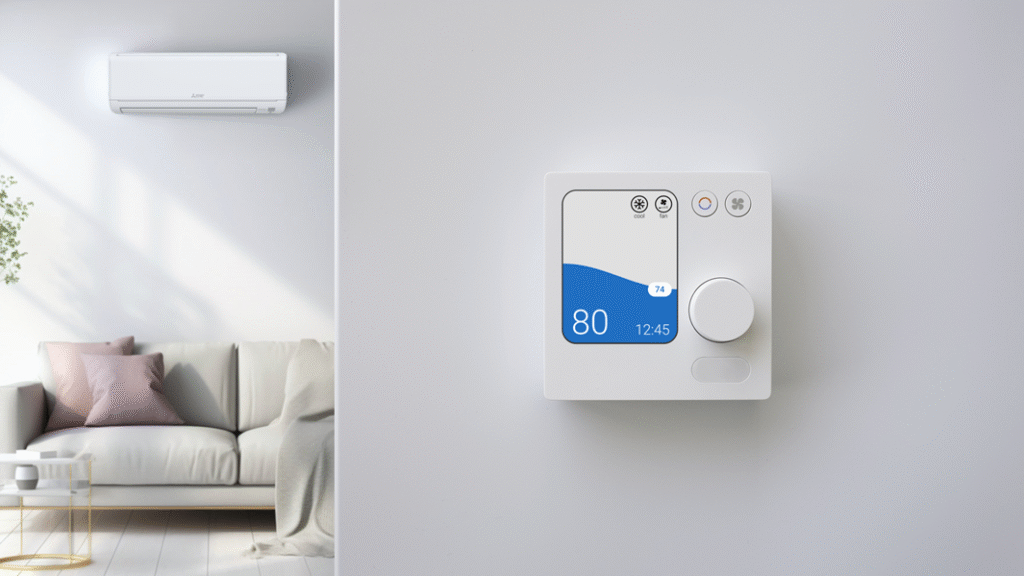Are your industrial HVAC systems eating away at your energy budget? You’re not alone.
Many businesses find themselves grappling with rising costs and inefficiencies. But there’s good news. Energy-efficient HVAC systems can transform your operations, saving you money and benefiting the environment. Imagine slashing those hefty energy bills while maintaining a comfortable and productive workplace.
Sounds appealing, right? In this guide, you’ll discover practical insights and strategies to optimize your HVAC systems for maximum efficiency. We’ll show you how to make smart investments that pay off in the long run, ensuring your business stays competitive and sustainable. Curious to learn how? Let’s dive in and explore the world of energy-efficient solutions tailored just for you.

Credit: primeraeng.com
Importance Of Energy Efficiency In Hvac Systems
Energy efficiency in HVAC systems reduces costs and environmental impact. Industrial systems can benefit from optimized energy use, ensuring sustainable operations. This guide explores strategies for achieving efficiency in HVAC systems.
Energy efficiency in HVAC systems is more than just a trend; it’s a necessity for modern industries. This focus on efficiency isn’t just about reducing energy bills—it’s a crucial step towards sustainable business practices. Understanding why energy efficiency is important can transform your approach to managing industrial HVAC systems.Cost Savings And Economic Benefits
Switching to energy-efficient HVAC systems can significantly cut down operational costs. Imagine reducing your energy bills by 30% or more. That’s money you could reinvest in other parts of your business. Consider this: a more efficient system reduces wear and tear. This means fewer repairs and longer equipment life, translating to lower maintenance costs. The initial investment might seem high, but the long-term savings are worth it. Are you ready to see more money staying in your pocket?Environmental Impact And Sustainability
Energy-efficient HVAC systems play a key role in reducing carbon footprints. By consuming less energy, these systems help lower greenhouse gas emissions. It’s a small step with a big impact on the environment. Think of the positive message this sends to your clients and partners. Being environmentally conscious can boost your brand image. Plus, it aligns your business with global sustainability goals. Isn’t it satisfying to contribute positively to the planet while running your business efficiently? Embracing energy efficiency in HVAC systems is a strategic decision for any industry looking to thrive economically and sustainably. What’s your next step towards a greener future?Types Of Energy-efficient Hvac Systems
Industrial facilities need efficient HVAC systems to reduce energy costs. Energy-efficient systems help conserve energy and protect the environment. Choosing the right type is crucial for optimal performance. Here, we explore various types that industries can consider.
Variable Refrigerant Flow Systems
Variable Refrigerant Flow (VRF) systems are flexible and energy-efficient. They adjust the refrigerant flow according to the demand. This reduces energy waste and ensures comfort. VRF systems can heat and cool different areas simultaneously. They are ideal for large buildings with varying needs.
Geothermal Heating And Cooling
Geothermal systems use the earth’s stable temperature for heating and cooling. They are efficient and environmentally friendly. These systems can reduce heating costs by up to 70%. They are reliable and have low maintenance needs. A great choice for sustainable energy solutions.
High-efficiency Heat Pumps
High-efficiency heat pumps are versatile for heating and cooling. They use less energy than traditional systems. These pumps can provide significant energy savings. They work well in moderate climates. Ideal for industries seeking cost-effective solutions.
Key Features Of Energy-efficient Hvac Systems
Energy-efficient HVAC systems offer lower energy costs and reduced carbon emissions. These systems integrate advanced technology for optimal performance. Smart controls and variable speed options ensure precise temperature regulation. Industrial users benefit from decreased maintenance needs and improved air quality.
When you think about upgrading your industrial HVAC system, energy efficiency should be at the top of your list. Energy-efficient HVAC systems not only help in reducing utility bills but also contribute to a sustainable environment. Let’s dive into the key features that make these systems stand out.Advanced Control Systems
Advanced control systems are like the brain of your HVAC setup. They allow you to monitor and adjust temperatures with precision, ensuring energy is used wisely. Imagine setting your HVAC to automatically adjust based on occupancy or outside weather conditions. These systems can even alert you to maintenance needs before they become costly issues. A friend once upgraded his factory’s HVAC control system, and it cut his energy costs by 20%—a significant saving for any business.Improved Insulation
Insulation isn’t just about keeping things warm. Improved insulation ensures that your HVAC system doesn’t have to work overtime to maintain temperature. If your building’s insulation is lacking, even the best HVAC system will struggle to be efficient. Enhanced insulation materials can help maintain the desired indoor climate with less energy. Consider how much easier it is to keep a thermos at the right temperature when it’s well insulated. The same principle applies to your industrial space.Energy Recovery Ventilation
Energy Recovery Ventilation (ERV) is a game-changer for industrial facilities. It allows you to reclaim energy that would otherwise be lost. ERV systems transfer heat and moisture between incoming and outgoing air streams, making temperature control more efficient. Have you ever noticed how some buildings feel more comfortable with less energy use? ERV might be the secret ingredient. It’s a smart way to maximize energy use while maintaining air quality. As you explore these features, consider how they might fit into your industrial setting. Could advanced controls or better insulation make a difference in your energy usage? How might energy recovery ventilation transform your space? These are questions worth pondering as you move toward a more energy-efficient future.Evaluating Hvac System Performance
Explore how industrial HVAC systems can perform better with energy-efficient solutions. This guide explains ways to reduce energy costs while maintaining a comfortable environment. Enhance system efficiency, cut expenses, and support sustainability in industrial settings.
Evaluating the performance of your industrial HVAC system is crucial for maintaining efficiency and reducing energy costs. It’s not just about keeping the temperature right; it’s about ensuring your system operates at optimal levels. Understanding the key aspects of evaluation can help you make informed decisions, leading to better performance and savings.Efficiency Ratings And Certifications
Do you know how efficient your HVAC system truly is? Efficiency ratings and certifications can provide this insight. Look for systems with high SEER (Seasonal Energy Efficiency Ratio) ratings. These numbers indicate how efficiently your system operates over a season. Certifications like ENERGY STAR can also guide you. They assure that the system meets strict energy efficiency guidelines set by the government. Choosing certified equipment can lead to significant energy savings over time.Monitoring And Maintenance
Do you have a regular maintenance schedule in place for your HVAC system? Consistent monitoring can prevent unexpected breakdowns and ensure peak performance. Regular check-ups can help identify issues before they become costly repairs. Invest in smart thermostats and sensors. These tools can provide real-time data and alerts, allowing you to make necessary adjustments swiftly. Always remember, a well-maintained system is not just efficient but also long-lasting. Evaluating your HVAC system’s performance is not a one-time task. It’s an ongoing process that requires attention and commitment. How can you optimize your system today to ensure better performance tomorrow?Design Considerations For Industrial Hvac Systems
Efficient HVAC systems help save energy in industrial settings. Proper design improves airflow and reduces costs. Key considerations include system size, insulation, and regular maintenance.
Designing an energy-efficient HVAC system for industrial use requires thoughtful planning and a keen understanding of specific needs. Every industrial space is unique, demanding a tailored approach to maximize efficiency and minimize costs. By focusing on key design considerations, you can ensure your system operates optimally, reducing energy consumption while maintaining a comfortable working environment.Space And Layout Planning
Before you start, assess the physical layout of your facility. Large open spaces or segmented areas may dictate different HVAC configurations. Consider the placement of machinery, which can generate heat and impact airflow patterns. Are there areas that require more cooling or heating than others? Identifying these zones helps in selecting and placing appropriate HVAC units. Also, think about future expansions. Designing with scalability in mind prevents costly overhauls later.Customized Solutions For Industrial Needs
No two industrial setups are alike, and your HVAC system should reflect this. Custom solutions can address unique operational challenges, ensuring efficiency and effectiveness. Evaluate the specific demands of your industry. A food processing plant might need strict temperature controls, while a warehouse might prioritize airflow. Tailoring your system to meet these needs can enhance productivity and save energy. Have you considered integrating smart technology? Automation and IoT-enabled systems can adapt to usage patterns, optimizing performance without manual adjustments. This not only saves energy but also reduces operational burdens. Remember, an efficient design isn’t just about technology—it’s about aligning the system with the unique demands of your industrial environment. What strategies have you found effective in your setting? Share your insights or questions in the comments below.Installation And Maintenance Best Practices
Efficient HVAC systems are crucial for industrial settings. Proper installation and maintenance ensure they run at peak performance. This guide outlines best practices for installing and maintaining these systems. It helps prolong their lifespan and reduce energy costs.
Professional Installation Guidelines
Hiring a certified technician is vital for HVAC installation. Professionals know the specific needs of industrial environments. They choose the right system size and type. This avoids overloading or underutilizing equipment. Proper ductwork installation is also essential. It ensures optimal airflow and temperature control. Professionals follow safety standards to prevent hazards. They test systems thoroughly before operation. This guarantees efficiency and reliability.
Regular Maintenance Strategies
Regular maintenance keeps HVAC systems running smoothly. Schedule inspections at least twice a year. Check filters, coils, and fans for dirt and debris. Clean them to improve airflow and efficiency. Monitor system performance regularly. Look for unusual noises or temperature changes. Early detection prevents costly repairs. Replace worn-out parts promptly. This avoids breakdowns and extends system life. Keep a maintenance log. Track service dates and issues for future reference.
Future Trends In Energy-efficient Hvac Systems
As industries worldwide strive to reduce their carbon footprint and energy costs, energy-efficient HVAC systems are becoming a focal point in industrial development. The future of these systems is brimming with innovation and technological advancements. Imagine a world where your HVAC system seamlessly adapts to environmental changes, maximizing efficiency and minimizing waste.
Smart Technology Integration
Picture your HVAC system communicating with other smart devices in your facility. This is not science fiction; it’s a reality with smart technology integration. By integrating IoT and AI, HVAC systems can predict and respond to changes in temperature and humidity. This means your system learns from patterns and adjusts settings automatically. It’s like having a personal assistant for your HVAC needs.
Consider the efficiency boost when your HVAC system knows the occupancy levels of your building. It adjusts accordingly, ensuring optimal energy use. Smart sensors can detect when areas are unoccupied and reduce heating or cooling, saving you money and energy. Isn’t it time your HVAC system worked smarter, not harder?
Innovative Materials And Designs
Think about the impact of materials on energy efficiency. Innovative materials are now at the forefront of HVAC design, offering better insulation and reduced energy consumption. Lightweight, durable materials not only enhance performance but also extend the lifespan of your system. Imagine reducing maintenance costs while boosting efficiency.
Designs are evolving too, focusing on compact systems that offer powerful performance. These designs cater to space constraints without compromising on efficiency. Modular systems allow you to customize based on your industrial needs. Could these advancements lead to significant savings in your operational budget?
Future trends in HVAC systems are not just about technology; they’re about redefining how you approach energy efficiency. Embrace these changes and consider how they can transform your industrial operations. What steps will you take to integrate these advancements into your facility?

Credit: bostonaircontrols.com

Credit: bostonaircontrols.com
Frequently Asked Questions
What Is The $5000 Rule For Hvac?
The $5000 rule for HVAC suggests replacing your system if the repair cost multiplied by its age exceeds $5000. This helps determine cost-effectiveness between repairing and replacing HVAC units. This rule ensures you make financially sound decisions regarding the maintenance or replacement of your HVAC system.
What Is The Most Energy Efficient Hvac System?
The most energy-efficient HVAC system is the geothermal heat pump. It uses the earth’s stable temperature for heating and cooling. This reduces energy consumption significantly, making it a sustainable choice for homeowners. Investing in a geothermal system can lower utility bills and minimize environmental impact.
Which Hvac System Is Best For Commercial Building?
The best HVAC system for commercial buildings is a Variable Refrigerant Flow (VRF) system. It offers energy efficiency, flexibility, and precise temperature control. VRF systems are ideal for large spaces with varying cooling and heating needs, ensuring comfort and reducing operational costs.
Consider professional consultation for tailored solutions.
What’s The Difference Between Industrial And Commercial Hvac?
Industrial HVAC systems handle large spaces and complex needs, providing robust heating, ventilation, and cooling. Commercial HVAC systems focus on smaller buildings and standard requirements, offering efficient climate control for businesses.
Conclusion
Energy-efficient HVAC systems benefit industries by reducing costs. They also help in lowering carbon footprints. Choosing the right system can improve productivity and comfort. Regular maintenance is crucial for long-term efficiency. Ensure systems are upgraded to meet current standards. This investment leads to savings and environmental responsibility.
Understanding the basics aids in making informed choices. Consult professionals for tailored solutions. Remember, small changes can yield big results. Prioritize energy efficiency for a sustainable future. Your industry’s success depends on smart energy decisions. Start today for a better tomorrow.



